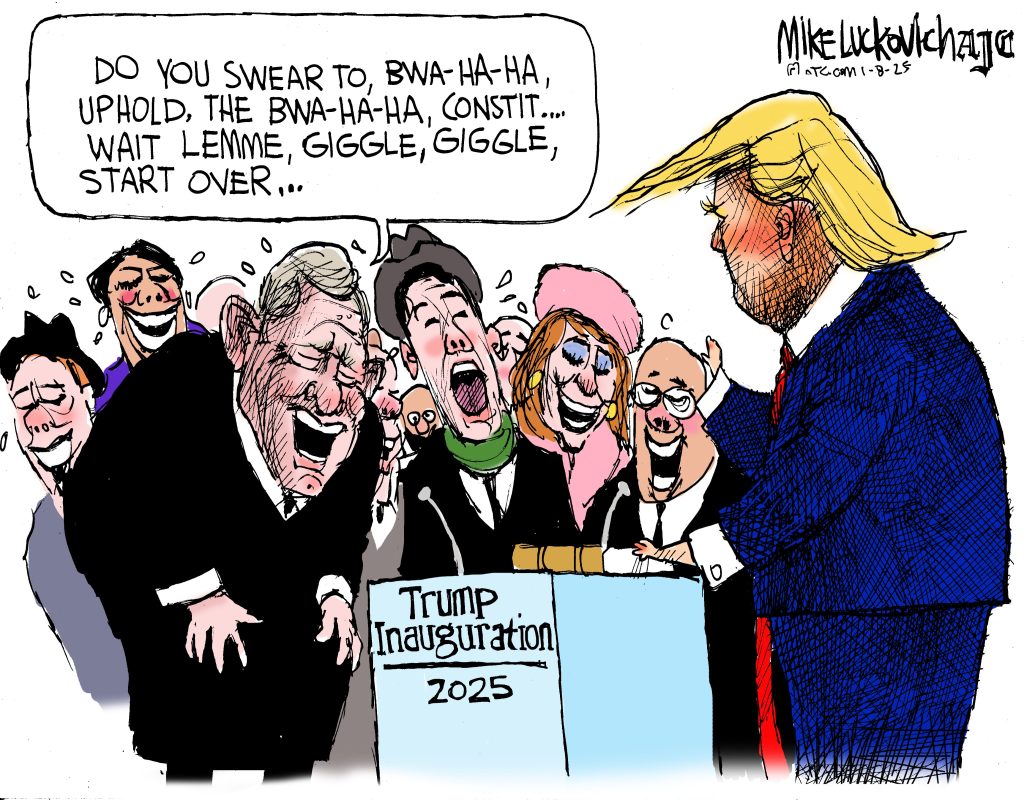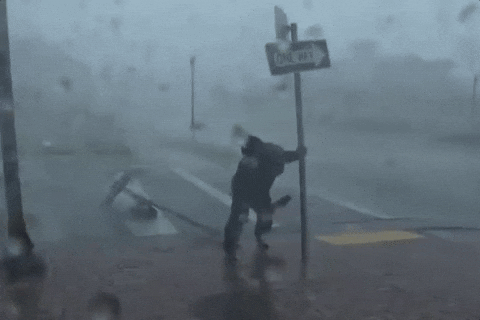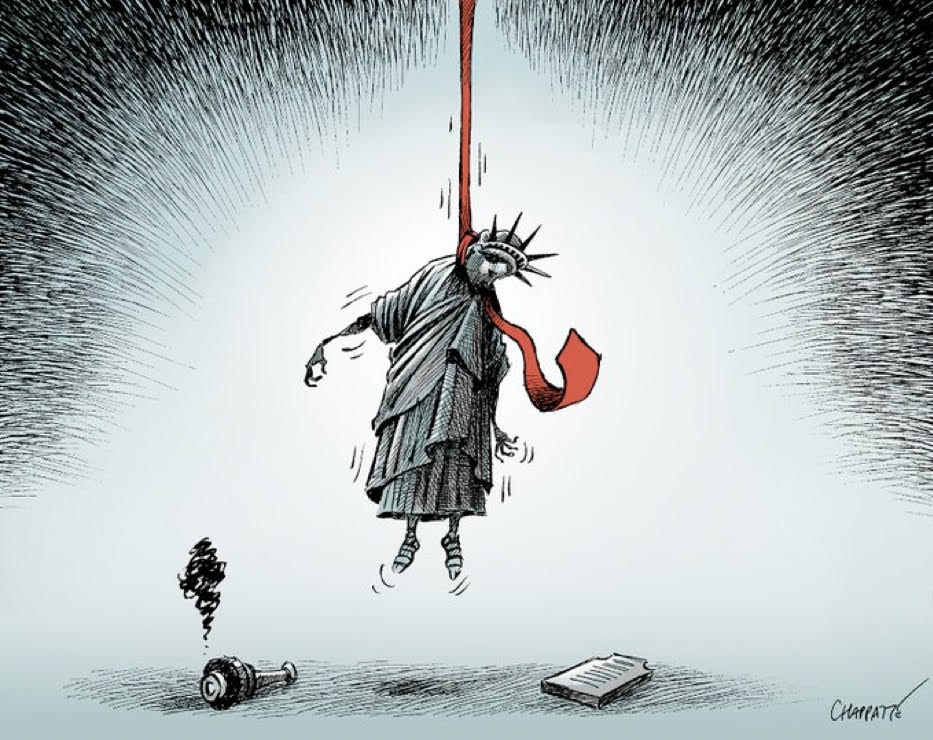Jack Smith’s report delivers a confession of the complete disintegration of the U.S. justice system

15 January 2025 (Brussels, Belgium) — Shortly after midnight last night, the U.S. Justice Department released special counsel Jack Smith’s final report on former president Donald Trump’s attempt to overturn the results of the 2020 presidential election. The 137-page report concludes that “substantial evidence demonstrates that Mr. Trump … engaged in an unprecedented criminal effort to overturn the legitimate results of the election in order to retain power.”
The report explains the case Smith and his team compiled against Trump. It outlines the ways in which evidence proved Trump broke laws, and it lays out the federal interests served by prosecuting Trump. It explains how the team investigated Trump, interviewing more than 250 people and obtaining the testimony of more than 55 witnesses before a grand jury, and how Justice Department policy governed that investigation. It also explains how Trump’s litigation and the U.S. Supreme Court’s surprising determination that Trump enjoyed immunity from prosecution for breaking laws as part of his official duties dramatically slowed the prosecution.
The historian Heather Cox Richardson summarized it as follows:
There is little in the part of the report covering Trump’s behavior that was not already public information. The report explains how Trump lied that he won the 2020 presidential election and continued to lie even when his own appointees and employees told him he had lost. It lays out how he pressured state officials to throw out votes for his opponent, then-president-elect Joe Biden, and how he and his cronies recruited false electors in key states Trump lost to create slates of false electoral votes.
It explains how Trump tried to force Justice Department officials to support his lie and to trick states into rescinding their electoral votes for Biden and how, finally, he pressured his vice president, Mike Pence, to either throw out votes for Biden or send state counts back to the states. When Pence refused, correctly asserting that he had no such power, Trump urged his supporters to attack the U.S. Capitol. He refused to call them off for hours.
Smith explained that the Justice Department concluded that Trump was guilty on four counts, including conspiracy to defraud the United States by trying “to interfere with or obstruct one of its lawful governmental functions by deceit, craft or trickery, or at least by means that are dishonest”; obstruction and conspiracy to obstruct by creating false evidence; and conspiracy against rights by trying to take away people’s right to vote for president.
I spent most of last night reading the entire Smith report, but to save time I want to note a few of her other points:
She goes on to note the report explains why the Justice Department did not bring charges against Trump for insurrection, noting that such cases are rare and definitions of “insurrection” are unclear, raising concerns that such a charge would endanger the larger case.
The report explained that prosecuting Trump served important national interests. The government has an interest in the integrity of the country’s process for “collecting, counting, and certifying presidential elections.” It cares about “a peaceful and orderly transition of presidential power.” It cares that “every citizen’s vote is counted” and about “protecting public officials and government workers from violence.” Finally, it cares about “the fair and even-handed enforcement of the law.”
Her key thought:
While the report contained little new information, what jumped out from its stark recitation of the events of late 2020 and early 2021 was the power of Trump’s lies. There was no evidence that he won the 2020 election; to the contrary, all evidence showed he lost it. Even he didn’t appear to believe he had won. And yet, by the sheer power of repeating the lie that he had won and getting his cronies to repeat it, along with embellishments that were also lies—about suitcases of ballots, and thumb drives, and voting machines, and so on—he induced his followers to try to overthrow a free and fair election and install him in the presidency.
He continued this disinformation after he left office, and then engaged in lawfare, with both him and friendly witnesses slowing down his cases by challenging subpoenas until there were no more avenues to challenge them. And then the U.S. Supreme Court stepped in.
Last year I did a full analysis of the extraordinary July 2024 decision of the U.S. Supreme Court in Trump v. United States declaring that presidents cannot be prosecuted for official acts. “Before this case,” the report reads, “no court had ever found that Presidents are immune from criminal responsibility for their official acts, and no text in the Constitution explicitly confers such criminal immunity on the President.” It continued: “[N]o President whose conduct was investigated (other than Mr. Trump) ever claimed absolute criminal immunity for all official acts.”
Cox notes that the report quoted the dissent of Justice Sonia Sotomayor, joined by Justices Elena Kagan and Ketanji Brown Jackson, noting that the decision of the Republican-appointed justices “effectively creates a law-free zone around the President, upsetting the status quo that has existed since the Founding.”
And I like her historical context:
That observation hit hard especially yesterday, January 14th, officially “Ratification Day”, the anniversary of the day in 1784 when members of the Confederation Congress ratified the Treaty of Paris that ended the Revolutionary War and formally recognized the independence of the United States from Great Britain. The colonists had thrown off monarchy and determined to have a government of laws, not of men.
But Trump threw off that bedrock principle with a lie. His success recalls how Confederates who lost the Civil War resurrected their cause by claiming that the lenience of General Ulysses S. Grant of the United States toward officers and soldiers who surrendered at Appomattox Court House in April 1865 showed not the mercy of a victor but rather an understanding that the Confederates’ defense of human slavery was superior to the ideas of those trying to preserve the United States as a land based in the idea that all men were created equal.
BANG!! When no punishment was forthcoming for those who had tried to destroy the United States, that story of Appomattox became the myth of the “Lost Cause”, defending the racial hierarchies of the Old South and attacking the federal government that tried to make opportunity and equal rights available for everyone.
In response to federal protection of Black rights after 1948, when President Harry Truman desegregated the U.S. military, Confederate symbols and Confederate ideology began their return to the front of American culture, where they fed the reactionary right. The myth of the “Lost Cause” and Trump’s lie came together in the rioters who carried the Confederate battle flag when they breached the U.S. Capitol on January 6, 2021.
In fact, Trump’s nominee for Secretary of Defense, Fox News Channel host Pete Hegseth, is adamant about restoring the names of Confederate generals to U.S. military installations because “they are an important part of our history”. That attack on the U.S. Capitol? Not so much. His confirmation hearing before the Senate Armed Services Committee began yesterday. I watched a bit of it. Then just turned it off.
Herein a few notes on the disintegration of the U.S. justice system.

For my regular readers, some of the following will be familiar. My mantra has been that no institution has given Trump more power – the “keys” – to destroying the administrative state and the judicial/legal system than the U.S. Supreme Court. But this has been building for years. It is a long story, deserving of a more detailed post so herein just a few key points. And it involves (of course), money and power. Because in America it is always about, only about the money.
And a few things up front. The U.S. legal “system” is a misnomer. It implies that it was intentionally designed to render *justice*. As Trump showed, it is a sham. Trump showed the world the U.S. *justice system* simply does not exist. It is a fantasy. The system pretends to desire “the truth” to “serve justice” – but it is simply a trillion-dollar money machine that requires lawyers to argue their point. The best argument wins. The truth is irrelevant. Trump has proved a rich man in the U.S. can purchase the law. In corporate law, a company can beat down its smaller opponent by making a case too expensive to pursue.
Trump has dallied, delayed, and paid lawyers (with other people’s money) since he attempted to overthrow the 2020 election – and he has succeeded. Where he has been found guilty, he has avoided sentencing. Where he has been ordered to pay compensation, he has not paid. He has shown he is above the law. He has shown that with enough cash for lawyers, the rule of law, the truth, and the very fabric of civilization is a house of cards.
Through that realistic lens, Trump had a huge advantage in the justice system. He has:
• an array of lawyers to delay and obfuscate and play every aspect of the Byzantine structure of the American legal system
• deep pockets
• the federal judges he appointed
• a cult following, and an ability to sway public opinion, which is political power
• volumes of experience in showing he is a singled-out victim
Trump learned the way to win is to cut every corner, trample on every ethical guideline, while his opponents primly weighed up the legal niceties and nuances. They were thumbing through the rulebook of the monastery – while in front of them a mafia don has set the monastery on fire.
And not just Trump. The corporate legal community does the very best at decimating the system. Just read two books I have quoted numerous times in my posts: Katharina Pistor’s The Code of Capital and Bruce Gibney’s The Nonsense Factory, withering examinations of how the American legal system has been gutted – by the very attorneys in the system.
And it continues to boggle my mind that, under Biden, the United States became the first country to face an attempted coup and not only fail to punish the coup plotters but allow them to hold office and make laws. There is no parallel in world history. For God’s sake, even Hitler had a prison interlude between his putsch and his presidency. The only thing approaching an equivalent lies in the American past: the refusal to punish confederates and instead let them regroup under new names, leading to the decimation of Reconstruction and the birth of Jim Crow.
I think it is fair to say America passed *reason* two or three election cycles ago, and decimated its *justice* system long ago. Pity the U.S. cannot invade itself to restore democracy. It will get even uglier. What Trump and his sycophants have unleashed cannot be put back in the bottle. Only the naïve still believe it can be reversed.
The Jack Smith report suggests that if the law had moved faster, Trump would be a convict today, not the president-elect. But the law did not move fast. Why not? Whose fault was that? Most say that U.S. Attorney General Merrick Garland deliberately “slow walked” the prosecution. Fingers will point, but finger-pointing does not matter. What matters is the outcome and the message. And Trump had the system gamed, as I noted above. David Frum of The Atlantic magazine nails it:
Trump swore to uphold the Constitution in January 2017. He violated that oath in January 2021. Now, in January 2025, he will swear it again. The ritual survives. Its meaning has been lost.
Frum also notes that in 2022, a prominent conservative intellectual proclaimed that the United States had entered a “post-Constitutional moment”:
Our constitutional institutions, understandings, and practices have all been transformed, over decades, away from the words on the paper into a new arrangement—a new regime if you will—that pays only lip service to the old Constitution. We’ve moved beyond the Constitution. It is not important any more.
That conservative was Russell Vought, one of the co-authors of the Heritage Foundation’s Project 2025 policy plan, and now President-Elect Trump’s choice to be director of the Office of Management and Budget, which controls and coordinates all actions by the executive branch. The post-constitutional moment that Trump supporters once condemned has now become their opportunity. They have transgressed the most fundamental rule of a constitutional regime, the prohibition against political violence – and instead of suffering consequences, they have survived, profited, and returned to power. Emboldened.
YES. The *transgression* has made them more powerful than they otherwise would have been. Bob Woodward gives an account in his 2018 book, “Fear“, that Gary Cohn, Trump’s chief White House economic adviser, thwarted Trump’s intent to withdraw from NAFTA and the U.S.–South Korea trade agreement by snatching the notification letters off the president’s desk. The story suggests something important about the difficulty Trump had imposing his will during his first term.
But for his upcoming second term, Trump has made defending his actions in 2021 a test of loyalty. Last month, The New York Times interviewed people involved in recruiting for senior roles in the Trump Defense Department or intelligence agencies; several of them had been quizzed about whether Joe Biden won the 2020 election and whether Trump did anything wrong in his challenge to the election on January 6. The clear implication was that to answer anything but “No” and “No” would have been disqualifying.
There will be no more Gary Cohns, only J. D. Vances who will deny the previous election result – and defend Trump’s actions to overturn it.
That is what a post-constitutional moment looks like.
Before Trump, American law was quite hazy on the legal immunity of the president. In 1982, the U.S. Supreme Court ruled that a president could not be sued for his official acts. In 1997, the Court ruled that a president could be sued for personal acts unrelated to his office. Both of these rulings applied only to civil cases, not to criminal ones. As Frum notes:
For nearly 250 years after the adoption of the U.S. Constitution, the question of the president’s rights under criminal law did not arise. Trump’s proclivity for wrongdoing forced the question on the country: Was a president of the United States subject to criminal law or not? Last year, the Supreme Court delivered a mess of an answer, the main holding of which seemed to be: “here’s a complex, multipart, and highly subjective set of questions to answer first. Please re-litigate each and every one of them while we sit around and wait to see whether Trump wins or loses the 2024 election”.
Now comes the Smith report with its simpler answer: If a former president wins reelection, he has immunity for even the worst possible crimes committed during his first term in office. And in Trump’s case, he does not need to worry about his next election. He can act. Unbound.
The incentives contained in this outcome are clear, if perverse. Democracy in the United States? Dead 💀

And so, here we sit – living in an anxious time. Some days, it can feel like the wheels are coming off and the planet is careening out of control. And it is not just that I am a life-long incurable skeptic and cynic – I can be an optimist when it is warranted – but that I am a realist.
Myriad geopolitical crises ricochet across our newsfeeds and disturb our conscience. Some are immediate and others endemic. Wherever we seem to turn, we see pain, danger, and disorientation. Edifices we once turned to for stability — our democratic governance, a largely peaceful world order, basic notions of truth — are collapsing, buckling. Will they ultimately crumble? And if they do, what waves of chaos and heartbreak will they unleash?
In addition to all that ails us in the broader world, many of you undoubtedly can add personal afflictions and ones that strike your family and friends. These include struggles of health, financial stability, loneliness, and hopelessness.
Granted, this era is the most brutal of times. We are living through social and technological change on the scale of the Agricultural or Industrial Revolution – but it is occurring in only a fraction of the time. What we are experiencing today – the breakdown of all existing authority, primarily but not exclusively governmental – is if not a predictable result, at least an unsurprising one. All of these other features are just the localized spikes on the longer sine wave of history.
And it is hard to accept the fact there is nothing inevitable about democracy, that there is nothing inevitable about stability. For all the success that democracies have had over the past century or more, they are mere blips in history. In the short history of mankind, no *democracy*, no *republic* has survived as such.
Nope. Monarchies, oligarchies, and other forms of authoritarian rule have been far more common modes of human governance. The emergence of liberal democracies is associated with ideals of liberty and equality that may seem self-evident and irreversible.
But these ideals are far more fragile than we believe. Their success in the 20th century depended on unique political and social conditions that now have proved ephemeral. And in 2025 Americans (and the rest of us) are going to see how ephemeral those conditions were.
Because we know from our history – the oh, so, incredibly short history of humanity on this planet – that moments of peril do not always get resolved. And sometimes the cost of resolution can be high – measured in high human suffering.
All civilizations are mortal. Ours is as well.
I’ll have more to come.
